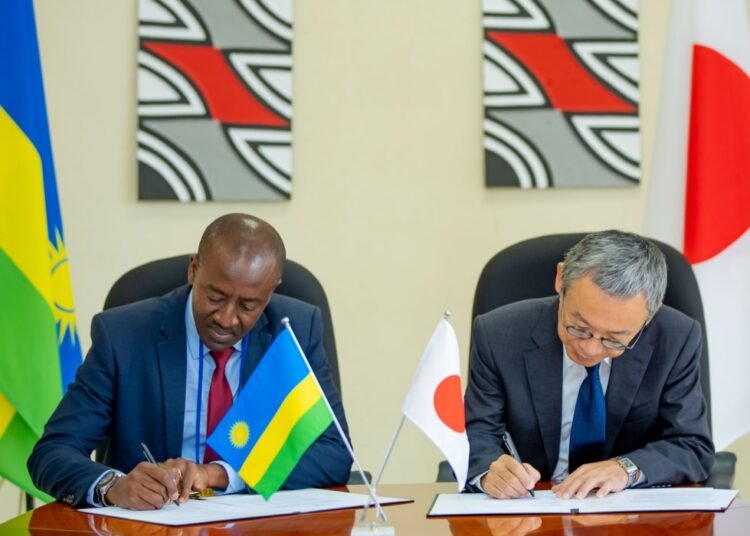The Japanese Ambassador to Rwanda, Isao Fukushima, and the Mayor of Rwamagana District in Rwanda, Radjab Mbonyumuvunyi have signed a $74,138 grant for the construction of Cyaruhogo marshland irrigation systems.
The signing ceremony happened on Tuesday March 14 and will see Japan providing funds to the district for the improvement of rice cultivation and farmers’ livelihood of more than 3,000 people in and around Rubona Sector.
The support is under the framework of Japan’s Grant Assistance for Grassroots Human Security Project (GGP/Kusanone).
Under this scheme, the Government of Japan provides grants to NGOs, educational institutions such as schools, health institutions such as hospitals and local authorities for their development projects at community level.
The project responds to diverse development needs in the areas of education, health, water and sanitation and agricultural development in Rwanda.
During the ceremony, Ambassador Fukushima explained the importance of contributing to the agriculture sector which is a mainstay of Rwanda’s economy.
“Agriculture is one of the priorities of Japan’s development assistance in Rwanda, along with infrastructure, safe water, and science and technology education, because agriculture has been and continues to be a mainstay of Rwanda’s economy as shown by the 2020 Census,” he said.
Irrigation is one of the most important components to enhance agricultural productivity in Rwanda and its expansion is set as a goal by 2024 in the Strategic Plan for the Transformation of Agriculture in Rwanda Phase 4.
Fukushima welcomed Rwamagana district’s great contribution to the project with expectations to see a great outcome.
“We admire the Rwamagana district’s great contribution to Rwanda’s Agriculture Sector and its economy as a whole. I sincerely hope that people in Rwamagana district will benefit from the new irrigation systems,” he said.
He said this project also aims to generate a synergistic effect with the Project for Water Management and Capacity Building (WAMCAB), under the support of Japan International Cooperation Agency (JICA) which started in 2019.
This WAMCAB Project intends to improve the capability of managing irrigation and water systems.
The project responds to diverse development needs in the areas of education, health, water and sanitation and agricultural development in Rwanda.
During the ceremony, Ambassador Fukushima explained the importance of contributing to the agriculture sector which is a mainstay of Rwanda’s economy.
“Agriculture is one of the priorities of Japan’s development assistance in Rwanda, along with infrastructure, safe water, and science and technology education, because agriculture has been and continues to be a mainstay of Rwanda’s economy as shown by the 2020 Census,” he said.
Irrigation is one of the most important components to enhance agricultural productivity in Rwanda and its expansion is set as a goal by 2024 in the Strategic Plan for the Transformation of Agriculture in Rwanda Phase 4.
Fukushima welcomed Rwamagana district’s great contribution to the project with expectations to see a great outcome.
“We admire the Rwamagana district’s great contribution to Rwanda’s Agriculture Sector and its economy as a whole. I sincerely hope that people in Rwamagana district will benefit from the new irrigation systems,” he said.
He said this project also aims to generate a synergistic effect with the Project for Water Management and Capacity Building (WAMCAB), under the support of Japan International Cooperation Agency (JICA) which started in 2019.
This WAMCAB Project intends to improve the capability of managing irrigation and water systems.






























































